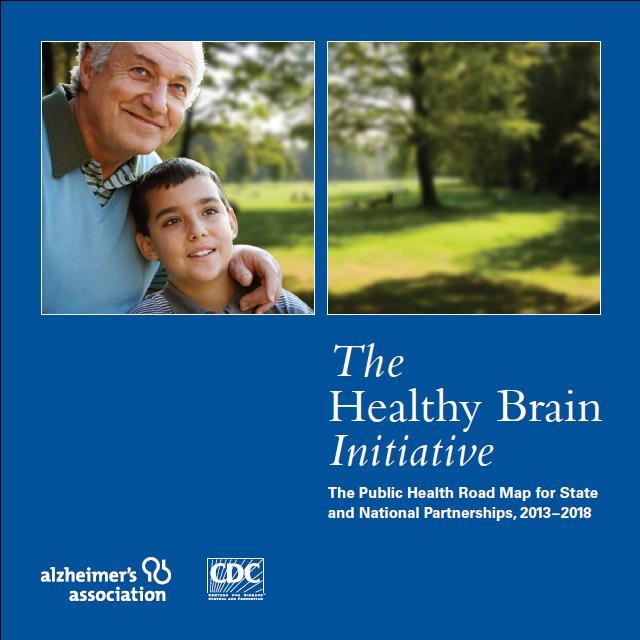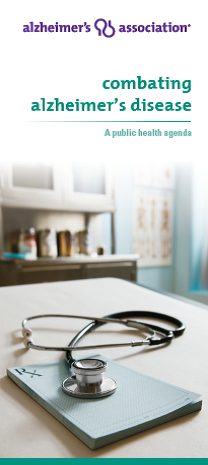New Recommendations for Protecting Cognition Through Physical Health
 High blood pressure, particularly in middle age, may increase the risk of developing dementia, according to a new scientific statement from the American Heart Association. The statement notes that while the link between mid-life hypertension and future cognitive impairment is not yet fully understood, thorough management of high blood pressure can help protect vascular health as well as overall brain health. High blood pressure, particularly in middle age, may increase the risk of developing dementia, according to a new scientific statement from the American Heart Association. The statement notes that while the link between mid-life hypertension and future cognitive impairment is not yet fully understood, thorough management of high blood pressure can help protect vascular health as well as overall brain health.
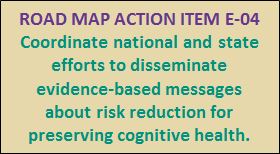 Additionally, new recommendations for physical activity are designed to help people maintain cognitive functioning throughout the aging process. These recommendations from the Global Council on Brain Health encourage people of all ages to become more physically active as a way to positively impact brain health. Additionally, new recommendations for physical activity are designed to help people maintain cognitive functioning throughout the aging process. These recommendations from the Global Council on Brain Health encourage people of all ages to become more physically active as a way to positively impact brain health.
These recommendations continue to mark the growing scientific consensus that there are steps that can be taken to protect cognition and help reduce the risk of cognitive decline and possibly dementia. Public health practitioners can consider using the Mind Your Risks program – a readymade risk reduction campaign from the National Institute of Neurological Disorders and Stroke that promotes healthy behaviors to manage high blood pressure to reduce the risk of stroke and possibly dementia.
These reports reinforce the need for public health agencies to effectively disseminate risk reduction information to promote brain health, as recommended in the Public Health Road Map. Jointly developed by the Centers for Disease Control and Prevention’s Healthy Aging Program and the Alzheimer’s Association, the Road Map is a guidebook for public health officials to address cognitive impairment and Alzheimer’s disease and provide for caregivers.
Upcoming Webcast: Cultural Challenges Among African American and Hispanic Communities
 On November 17, a live webcast will explore the clinical and cultural challenges of dementia in African American and Hispanic communities. While research shows that the symptoms and course of dementia are similar across race and ethnicity, disparities exist among ethnic minorities, including being less likely to receive a formal diagnosis. Register now for this webcast hosted by the State University of New York School of Public Health. On November 17, a live webcast will explore the clinical and cultural challenges of dementia in African American and Hispanic communities. While research shows that the symptoms and course of dementia are similar across race and ethnicity, disparities exist among ethnic minorities, including being less likely to receive a formal diagnosis. Register now for this webcast hosted by the State University of New York School of Public Health.
Training like this can help public health practitioners develop and use culturally-appropriate strategies to promote early detection and diagnosis of Alzheimer’s disease, as recommended by the Public Health Road Map. Public health and community partners around the country are already tailoring outreach specifically to Latino and Hispanic populations. In Oregon, for example, a fotonovela (a narrative tool with pictures and story) helps Spanish-speaking families understand the importance of timely detection and diagnosis of cognitive impairment. And in Minnesota, the Latino Collaborative for ACTing on Alzheimer’s continues engaging the Latino community to better ensure dementia-readiness (view their progress report).
Balance Needed Between Primary and Specialty Dementia Care
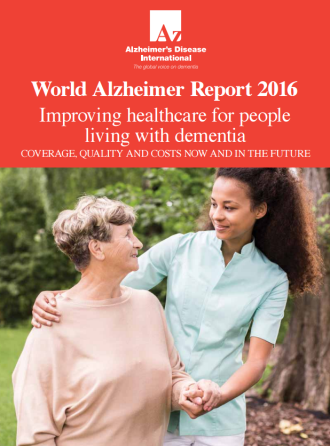 Rebalancing the division between primary and specialty care for those with dementia may help ease the growing burden on the health care system while reducing costs, according to this year’s World Alzheimer Report from Alzheimer’s Disease International. Noting that, particularly in high-income countries, dementia health care is provided largely by specialists (including neurologists, geriatricians, and psychiatrists), the report calls for greater involvement of primary care staff in dementia care to meet this growing burden. Rebalancing the division between primary and specialty care for those with dementia may help ease the growing burden on the health care system while reducing costs, according to this year’s World Alzheimer Report from Alzheimer’s Disease International. Noting that, particularly in high-income countries, dementia health care is provided largely by specialists (including neurologists, geriatricians, and psychiatrists), the report calls for greater involvement of primary care staff in dementia care to meet this growing burden.
Additionally, lack of care coordination among providers, inconsistent access to dementia care services, and inadequacy of dementia training for health care professionals may all contribute to substandard care for people living with dementia. The report recommends establishing clear case management and care coordination protocols to better help people manage both dementia and other comorbid chronic conditions.
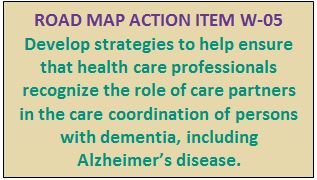 The public health community can help providers recognize the role of care partners in the care coordination of people with Alzheimer’s disease and other dementias, as suggested by the Public Health Road Map. Consider distributing Managing Older Patients with Cognitive Impairment: A Quick Guide for Primary Care Physicians – developed by the National Institute on Aging at the National Institutes of Health – a guide suggesting care strategies for older adult patients with diagnosed cognitive impairment or dementia. The public health community can help providers recognize the role of care partners in the care coordination of people with Alzheimer’s disease and other dementias, as suggested by the Public Health Road Map. Consider distributing Managing Older Patients with Cognitive Impairment: A Quick Guide for Primary Care Physicians – developed by the National Institute on Aging at the National Institutes of Health – a guide suggesting care strategies for older adult patients with diagnosed cognitive impairment or dementia.
Emergency Department Visits in North Carolina on the Rise among Dementia Patients
 In North Carolina, emergency room visits among those with Alzheimer’s disease and other dementias rose 168 percent between 2010 and 2014, according to a new fact sheet from the North Carolina Injury and Violence Prevention Branch of the Department of Health and Human Services. Of the nearly 600,000 emergency room visits among people aged 65 and older examined for this study, visits with a dementia diagnosis increased over time while those with other mental health diagnoses remained steady. In North Carolina, emergency room visits among those with Alzheimer’s disease and other dementias rose 168 percent between 2010 and 2014, according to a new fact sheet from the North Carolina Injury and Violence Prevention Branch of the Department of Health and Human Services. Of the nearly 600,000 emergency room visits among people aged 65 and older examined for this study, visits with a dementia diagnosis increased over time while those with other mental health diagnoses remained steady.
The rate of emergency room visits also grew exponentially with age. People with dementia aged 85 visited the ER nearly 10 times as frequently as those aged 65. Additionally, over two-thirds of all ER visits with a diagnosis of dementia arrived via ambulance. Information like this fact sheet can help policymakers and health care leaders better understand the impact and burden of Alzheimer’s and other dementias on health systems.
For other implementation examples of the Public Health Road Map, please see our Road Map Resource Guide. Contact Molly French for more information.
The Alzheimer’s Public Health E-News is supported by Cooperative Agreement #NU58DP006115-02 from the Centers for Disease Control and Prevention (CDC). Its contents are solely the responsibility of the Alzheimer’s Association and do not necessarily represent the official views of the CDC.
For subscription services or to view previous issues of Alzheimer’s Public Health News, please visit http://alz.org/publichealth/public-health-news.asp or contact John Shean (jshean@alz.org).
|
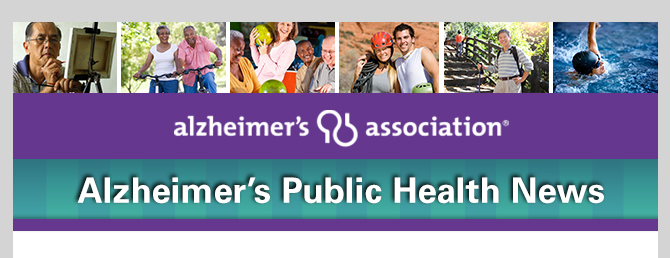


 High blood pressure, particularly in middle age, may increase the risk of developing dementia, according to a new
High blood pressure, particularly in middle age, may increase the risk of developing dementia, according to a new  Additionally, new
Additionally, new 

 The public health community can help providers recognize the role of care partners in the care coordination of people with Alzheimer’s disease and other dementias, as suggested by the
The public health community can help providers recognize the role of care partners in the care coordination of people with Alzheimer’s disease and other dementias, as suggested by the 